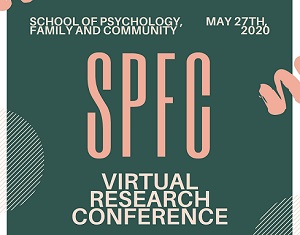Faculty-Student Collaboration
1
Faculty Sponsor(s)
Paul Youngbin Kim, Ph.D.
Presentation Type
Event
Project Type
Research in progress
Primary Department
Psychology
Description
Perfectionism, cultural values, and self-compassion can all impact the ways in which a person may present themselves. The desire to appear perfect has been found to mask psychological distress. Our study examines how perfectionism, as well as other variables that influence self-presentation, can impact help-seeking attitudes. We focus on the influence of perfectionistic self-presentation on mental health outcomes in Asian American college students. We predicted that self-compassion will be correlated with positive help-seeking attitudes, while perfectionistic self-presentation will be related to more unfavorable help-seeking attitudes. We also examine how culture, specifically emotional self-control and family recognition through achievement, can alter these relationships. Data collection is still ongoing, but preliminary correlations based on 101 Asian American college students indicated that help-seeking attitudes was correlated with cultural value of emotional restraint, and the perfectionistic self-presentation subscale of non-disclosure of imperfection.
Copyright Status
http://rightsstatements.org/vocab/InC/1.0/
Additional Rights Information
Copyright held by author(s).
Included in
Role of perfectionism, self-compassion, and cultural values on help-seeking attitudes of Asian American college students
Perfectionism, cultural values, and self-compassion can all impact the ways in which a person may present themselves. The desire to appear perfect has been found to mask psychological distress. Our study examines how perfectionism, as well as other variables that influence self-presentation, can impact help-seeking attitudes. We focus on the influence of perfectionistic self-presentation on mental health outcomes in Asian American college students. We predicted that self-compassion will be correlated with positive help-seeking attitudes, while perfectionistic self-presentation will be related to more unfavorable help-seeking attitudes. We also examine how culture, specifically emotional self-control and family recognition through achievement, can alter these relationships. Data collection is still ongoing, but preliminary correlations based on 101 Asian American college students indicated that help-seeking attitudes was correlated with cultural value of emotional restraint, and the perfectionistic self-presentation subscale of non-disclosure of imperfection.


